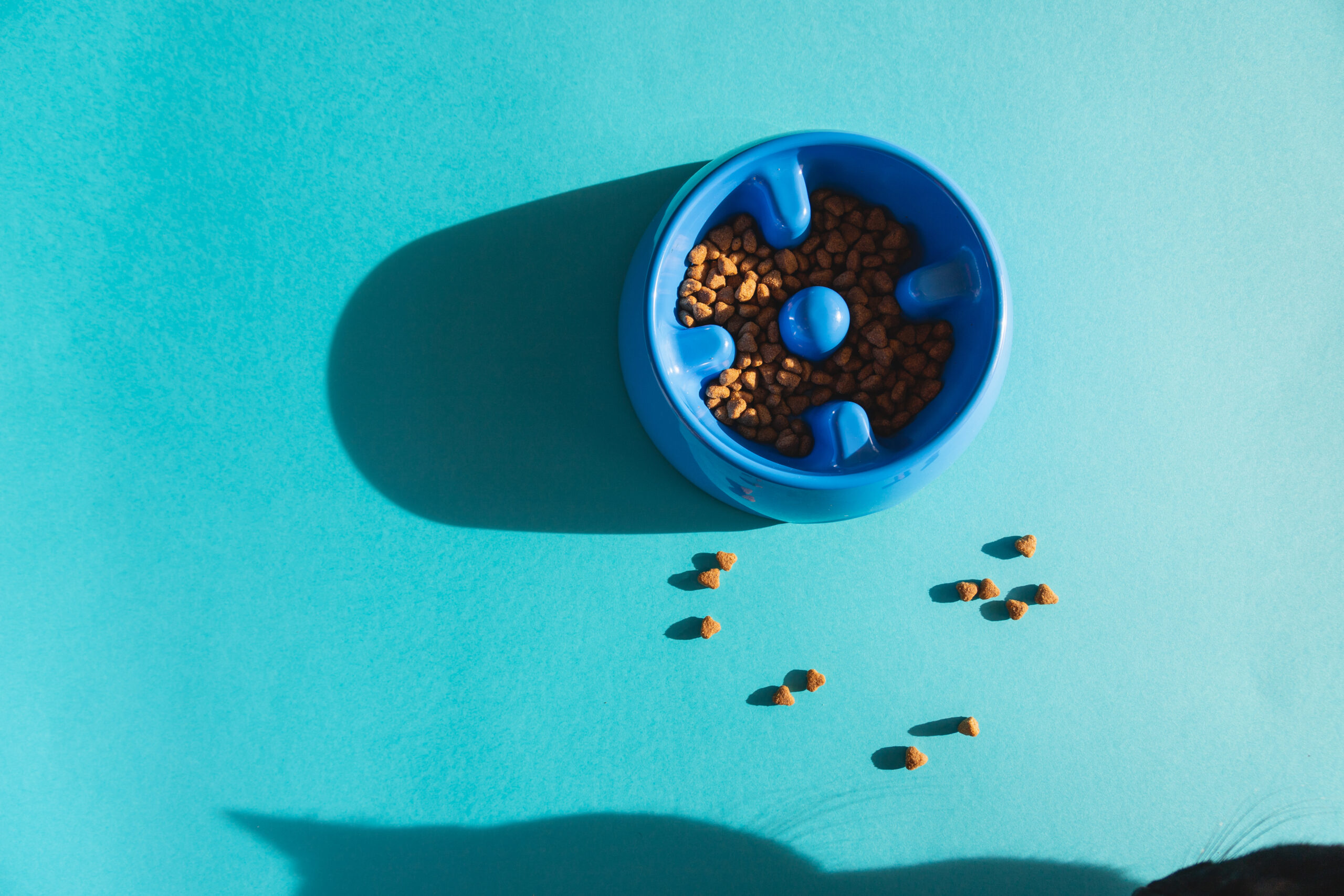Puppies, like babies, are straight-up adorable. They scamper, they play, they stare at you longingly… But, much like infants, they can also be prone vomiting and spitting up.
Dealing with vomit is a standard part of caring for a puppy, and in many cases, it’s normal for your puppy to vomit. But vomiting can also be the sign of serious health issues, and in some cases, it can signal that your puppy needs emergency treatment. Understanding what’s normal for your puppy—and what isn’t—can help you to determine if your pup needs to see a vet, or maybe just a few extra belly rubs.
- Puppies vomit pretty often, and it’s usually not a cause for alarm. Your puppy might throw up as the result of starting a new food, eating too fast, stress, or food sensitivities.
- You’ll want to take your puppy to the vet right away if they’ve eaten a foreign body or something toxic; there is blood in their vomit; their gums are pale or white; or if they are lethargic.
- ‘Regurgitation’ refers to when your puppy expels food they’ve just eaten. It’s caused by eating too much, or too fast, and generally isn’t cause for concern.
- If your puppy is vomiting, your vet might recommend a short fast to reset your pup’s digestive system.
Do puppies vomit often?
Vomiting isn’t necessarily cause for alarm. It’s something that puppies do pretty often, poor things. Puppies (and adult dogs) may vomit up food that isn’t agreeing with their stomachs. The vomit reflex can help to protect them from poisoning, especially if they accidentally ate something that wasn’t as edible as they thought it was.
There are several other instances where vomiting probably isn’t very serious. In these cases, you don’t have to rush to the emergency vet—but it’s a good idea to schedule an appointment for your puppy to be seen if the trouble continues for over 48 hours.
Here are some possible causes of vomiting:
- Sudden diet changes or introducing new dog food
- Dietary indiscretions, like eating fatty table scraps or other human foods
- Food allergies or food intolerances
- Stress or severe anxiety
- Motion sickness caused by a car ride
- Nausea caused by hunger and an empty stomach
In some cases, though, vomiting can be caused by serious health issues that can even be life-threatening. While there are countless potential causes for your dog’s vomiting, here are some of the most common underlying causes that do require veterinary treatment:
- Eating a toxin like mouse poison, prescription drugs, antifreeze, a toxic plant, grapes, raisins, cherry pits, or anything containing the artificial sweetener xylitol
- Intestinal blockages caused by ingestion of a foreign body like a toy, sock, bones, stones, or sticks
- Viral infections like parvovirus
- Intestinal parasites like roundworms
- Health conditions like liver disease, kidney disease, or pancreatitis
- Bloat (gastric dilatation-volvulus)
- Severe constipation
- Electrolyte imbalances
The difference between vomiting and regurgitation
Gross trivia time: What’s the distinction between vomiting and regurgitation? (If you’re eating lunch right now, pause for a sec.)
If your puppy is vomiting, they will act like they’re sick, and their vomit will contain bile. It’ll also be smelly and slimy. You will also notice your dog heaving in an effort to vomit.
But regurgitation is different. If your puppy regurgitates, they are expelling food that they just ate. Regurgitation is quick and doesn’t involve heaving, and your puppy won’t feel nauseous. In fact, once your puppy has regurgitated food, they’ll often continue acting completely normally and might even try to eat the undigested food that they’ve just regurgitated, which is always…delightful.
Puppies often regurgitate because they’ve eaten too much food, or they’ve simply eaten too quickly. It’s a case where they get a little too overambitious about their meals, and their stomachs just can’t keep up. Hey, we’ve all been there, though humans tend to have slightly better table manners.
To prevent regurgitation, you can feed your puppy smaller meals and use a treat toy or a slow feeder bowl to force your puppy to take a little more time and enjoy their meals.

What does my dog’s vomit mean?
Well now, that’s a seriously existential question.
The appearance of your puppy’s vomit can give you some clues about why your puppy is vomiting in the first place. Getting up-close-and-personal with your pup’s upchuck might not sound like fun, but it could help give you some peace of mind.
| What my puppy’s vomit looks like | What it means |
|---|---|
| Yellow | This indicates bile, and is caused by your pup having an empty stomach for a prolonged period of time. |
| White foam | Your puppy may be experiencing coughing or significant stomach irritation. |
| Dark brown or black | Dark brown or black vomit could indicate that there’s dirt in the vomit, but it could also indicate blood. Blood often looks like coffee grounds in the vomit—and is an emergency. It could also be a sign your dog ate chocolate—also an emergency. |
| Bright red blood | Bright red blood is often caused by irritation or a cut in your puppy’s throat or mouth. |
| Chunky | If you notice chunks of food in the vomit, then your puppy has regurgitated soon after eating, and the food hasn’t had time to digest. |
| Green | Your puppy’s vomit may appear green if they’ve eaten grass. If your puppy vomits green on an empty stomach, it indicates nausea. Bright green vomit could be a sign your pup ingested rat poison (which is dyed this color so it can be easily spotted!). |
| Clear liquid | Puppies may vomit a clear liquid when they have an empty stomach. It can also be caused by coughing related to kennel cough. |
When is vomiting a reason to go to the vet?
With so many possible explanations for dog vomiting, it can be difficult to tell why your puppy is throwing up, and how urgent the situation is.
If your puppy is healthy but throws up often, they might just have a sensitive stomach, but there could also be a more serious issue going on.
Here are some situations where you need to get your puppy to a vet immediately:
- There are signs of blood in their vomit
- Your puppy is vomiting and having diarrhea simultaneously
- Your puppy is unable to keep any food or water down
- You know your puppy has ingested a foreign body or toxin
- Your puppy is also lethargic, weak, depressed
- Your puppy has pale or white gums
If your puppy doesn’t have any of these concerning symptoms, though, you can call your vet’s office. They may recommend a short-term fast to give your pup’s stomach a chance to reset and recover.
But if your pup’s vomiting continues for 12–24 hours, it’s time to head to the vet clinic. Vomiting can dehydrate a puppy easily, and it can also lead to weight loss. It’s important to get to the bottom of the issue that’s causing the vomiting.
How do vets treat vomiting?
If you need to take your puppy to the vet, the vet will ask you for as much information about the issue as possible. Describing the frequency and consistency of the vomiting episodes can help your vet to narrow down potential causes and decide which steps to take first. Your vet will also ask about any other relevant information, like recent diet changes.
Next, it’s time for tests. Your vet might run diagnostic tests like ultrasounds or x-rays, bloodwork, and fecal and urinary testing.
If the x-rays reveal that your puppy is vomiting because of an intestinal blockage, the vet may perform surgery to remove that foreign object.
Your puppy may receive fluids to keep them hydrated, and your vet may also prescribe medications to help soothe an irritated stomach. Additional treatments will depend on the root cause of your puppy’s vomiting.
FYI: If you signed up for pet health insurance for dogs before your pet shows symptoms, then diagnostics and treatment for your pup’s illnesses would likely be covered, including ones that could be causing some unpleasant upchucking. (Also, if your pet is under 2 years old, Lemonade offers a Puppy/Kitten Preventative package, which covers things like spaying or neutering, microchipping, and heartworm and flea medication.)
What are some home remedies to treat and prevent puppy vomiting?
Under your vet’s direction, you may be able to fast your puppy.
- To start, you won’t feed or give your puppy water for two to four hours after they vomit
- Then, offer small amounts of water and a bland meal of boiled chicken breast and white rice
- If your puppy keeps that initial small meal down, you can gradually feed additional small bland meals
This brief fasting is often enough to relieve upset stomachs and help to get your puppy back on track.
If your puppy is regurgitating food after eating a meal, then using a slow-feeder bowl can prevent your puppy from eating too quickly. You may also have success feeding smaller, more frequent meals throughout the day.
If you do need to change your puppy’s diet, be sure to introduce the new food slowly. Add just a bit of the new food to your puppy’s existing grub, then gradually increase the amount of new food while decreasing the amount of old food. Ideally, try to make the transition over a two-week period so your puppy can gradually get used to the new food.
Before we go…
Much like human babies, all puppies vomit, and isn’t usually a cause for concern. However, it’s important to keep a close eye on the frequency and consistency of your puppy’s vomit to see if it might call for some veterinary intervention.
If you have any doubts about whether your pup needs treatment, be sure to give your vet a call. Your vet can help you to determine the cause of the vomiting, so you can help get your puppy feeling happy and healthy again.
A few quick words, because we <3 our lawyers: This post is general in nature, and any statement in it doesn’t alter the terms, conditions, exclusions, or limitations of policies issued by Lemonade, which differ according to your state of residence. You’re encouraged to discuss your specific circumstances with your own professional advisors. The purpose of this post is merely to provide you with info and insights you can use to make such discussions more productive! Naturally, all comments by, or references to, third parties represent their own views, and Lemonade assumes no responsibility for them. Coverage and discounts may not be available in all states.





